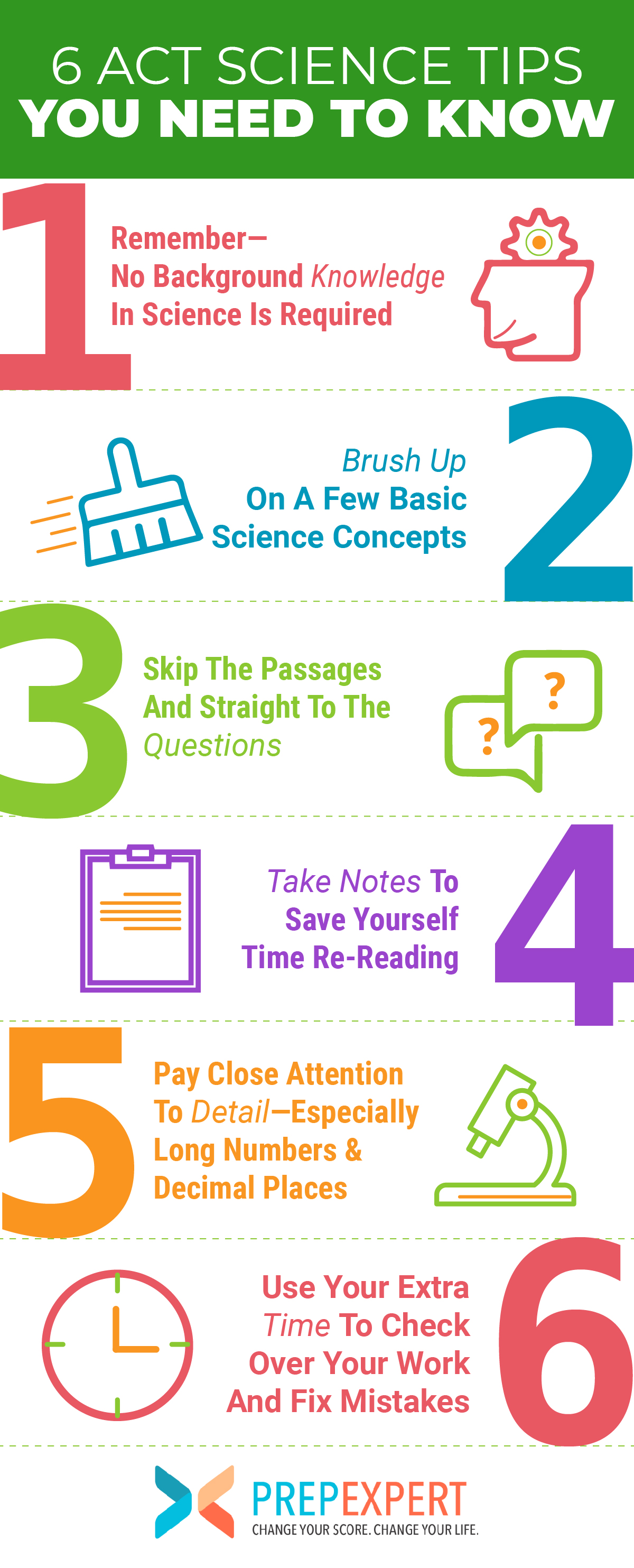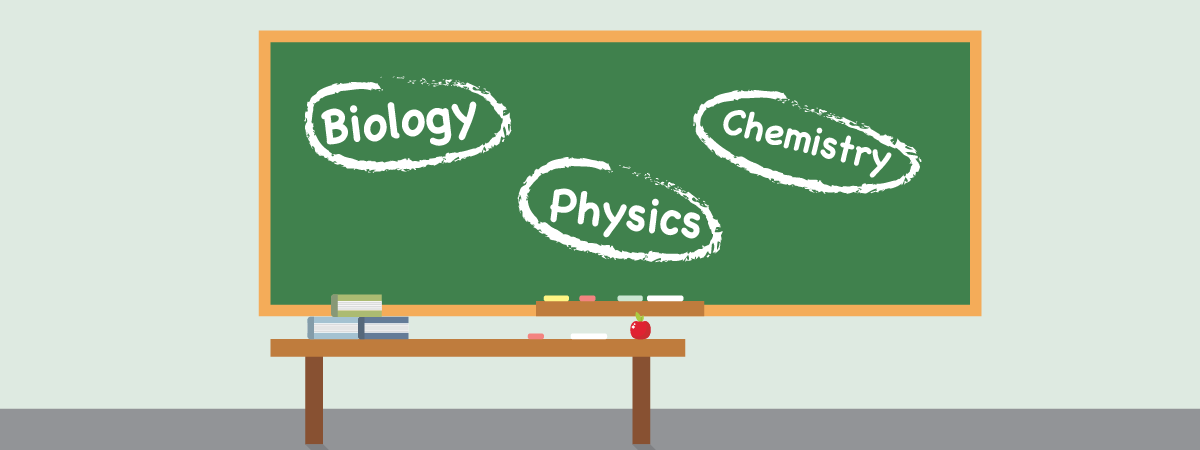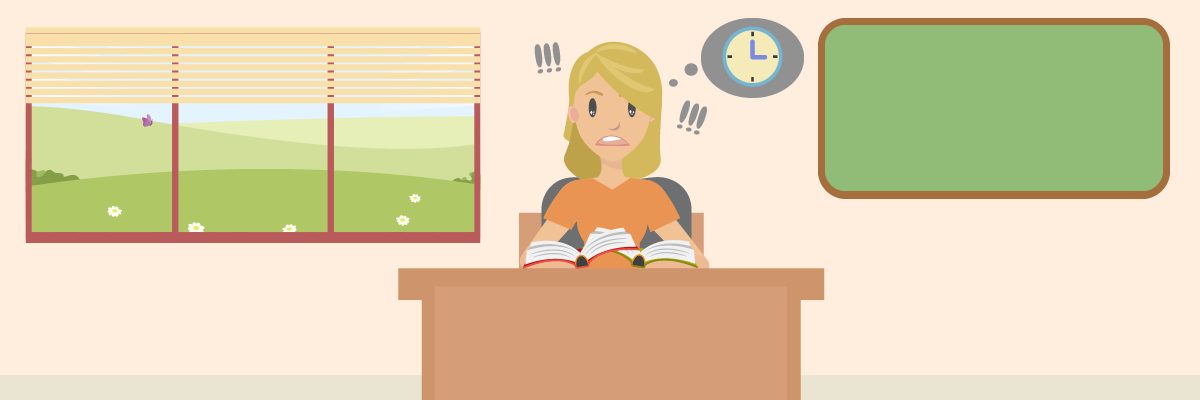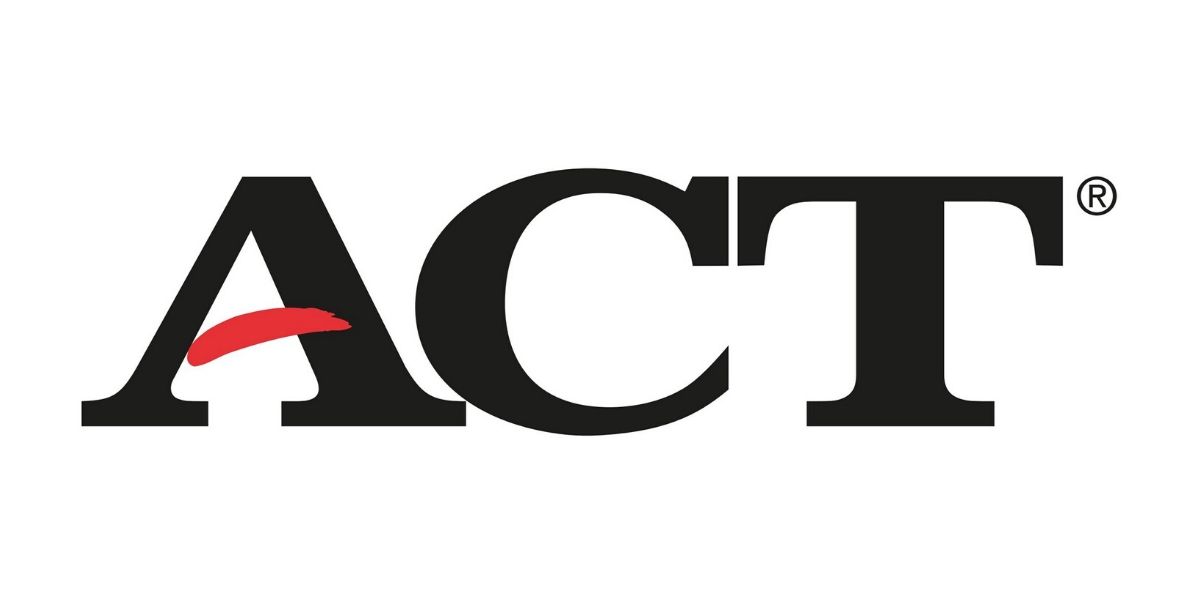6 ACT Science Tips You Need To Know
If you haven’t taken the ACT before, you might be a bit nervous about the Science test. After all, science is a tough subject for many, especially for more left-brained types. Nor is Science a subject that’s tested on the more well-known SAT.
But, there’s no reason to panic: you can ace the Science test if you brush up on your logic, data interpretation skills, and some basic Science concepts beforehand—and go straight to the questions on exam day.
More details below. If you happen to need extra help on the ACT Science test, consider taking an ACT prep course with Prep Expert®.
[act_one]


Remember—No Background Knowledge In Science Is Required
The Science test, actually called the Science Reasoning test, requires no background knowledge in science—it’s actually a test of your logic and data interpretation skills. So, don’t sweat it if you did awful in your bio, chem, or physics class.
If aren’t strong in the sciences, or perhaps haven’t completed courses like as chemistry or physics yet, you’ll be okay. Because the Science Test test is meant to measure your ability to analyze and interpret data, all the information you need to answer the questions is contained in the passages. You’re not gonna be drilled on what you studied in your high school Science classes.
Do you know how to read line graphs, scatterplots, tables, and pie charts? If you do, and you’re good at paying close attention to detail, then you have it within you to ace the Science Test. If you’re a bit shaky with these things and need some extra help, an ACT test prep course with Prep Expert® can provide you with a great overview of what you need to know for the Science test and put you in great shape for exam day.

But, Brush Up On A Few Basic Science Concepts
Although it’s not essential, knowing a little bit about some very basic areas of Science will make Science test a bit easier for you.
As mentioned above, you don’t need any prior Science knowledge to get a 36 on the Science test. All the information you need is in the passages, and if you don’t know what a particular scientific term means, you can always use context clues to help you decipher its meaning.
[leadmagnet_five]
However, if you go into the exam knowing a few basic Science terms and concepts, you’ll save yourself the extra step of using context clues.
These concepts, listed by their respective field of science, are: biology (cell biology, DNA, RNA and ribosomes, natural selection); chemistry (basic molecule structure; freezing and boiling points of water in Celsius, pH scale, molar mass concepts, how charges interact, phase changes); physics (gravity, density formula, density rules).
Don’t let this list send you into a mad frenzy of studying your old Science textbooks. You only need a basic familiarity with these topics for the Science test. For a 36, spend most of your time taking practice Science tests, rather than burying your nose in your physics book.

Skip The Passages And Go Straight To The Questions
You don’t need to read the passages first on the Science Test.
On Science test passages, you’ll notice that most of the questions provide you with the exact location of the information you need (Table 1, Figure 2, etc.) to answer the questions. This renders it unnecessary to read the passages ahead of time—you’ll be pointed to the right information as you need it.
For questions without citations, you can use keywords to guide you to the information you need. A good keyword is a word from the question or answer choices that you can scan the passage for to quickly find the information you need to come up with an answer. For example, if your question is about mitochondria, use that as your keyword.
You might wonder, Is there any harm in reading the passages ahead of time? Not really—although it will eat up more of your time. If you tend to run out of time with questions left to answer on the Science test, don’t read the passages beforehand.
There is one exception to this strategy: for the conflicting viewpoints passage of the Science test (where you are asked to compare and contrast the views of two scientists), you should read the passages ahead of time, so that you understand each respective scientist’s view before answering questions about the similarities and differences in their views.
The conflicting viewpoints passage is easy to identify because it is the only passage on the Science test where two scientists’ viewpoints are discussed.
[act_two]

Take Notes To Save Yourself Time Re-Reading
As you answer questions on the ACT Science test, you’ll be looking at the same tables, charts, graphs and figures over and over again. So, take notes the first time you check something out—writing in your own words what it tells you—to save yourself time re-reading later on.
When you’ve moved on to another question and need to reference the same item again, you’ll already have a solid grasp of the information it provides.
[leadmagnet_two]
Although note-taking is definitely a timesaver, some students are still concerned it’ll slow them down. Here’s what I have to say about that—if you think note-taking isn’t for you, try it out on a couple practice tests, anyway. On the Science test—and throughout the ACT—it’s essential to experiment with different test-taking strategies to find the approach that’s best for you.
For example, if you’re someone who often misses crucial details on the Science test, slowing down a bit and taking notes might just be your recipe for success.

Pay Close Attention To Detail—Especially Long Numbers & Decimal Places
You’ll need to do a little bit of Math on the Science test—basic addition, subtraction, multiplication, and division—so pay attention to detail, so you don’t miss things like decimal places or signs.
Although you’re not allowed to use your calculator on the Science test like you are on the Math Test, fear not—you won’t need it, anyway. For the basic Math, you will be doing, though, you’re often dealing with long numbers with many decimal places. If you’re not careful, it’s easy to make lots of simple mistakes.

Use Your Extra Time To Check Over Your Work And Fix Mistakes
On the Science Test, you have 35 minutes to answer 40 questions—almost a minute per. Since you’ll be going straight to the questions, you won’t be as pressed for time as you are on the Reading test. So, use that extra time to go over your answers when you’re finished—you’re bound to spot a few errors.
When it comes to timing, the Science test is probably the easiest of the four tests on the ACT to finish in time—which will probably come as a relief after your long slog through the English, Math and Reading tests. So long as you don’t waste too much time fixating on the more difficult questions, you should have ample time to finish.
[act_three]
For more test strategy, college admissions, and scholarship application tips sign up for our FREE class happening right now!
Written by Todd Marcus
More from Todd Marcus

Taking The ACT Junior Year
If you're ambitious and want to give yourself plenty of time for score improvement, then consider taking the ACT junior…

ACT 2020 Score Release Dates
Here then are the ACT 2020 score release dates to plan around, as well as, the different kinds of available…

How To Determine Your Average SAT Study Time
If you want a high score on the SAT, then you need to put in the hours. There's no way…